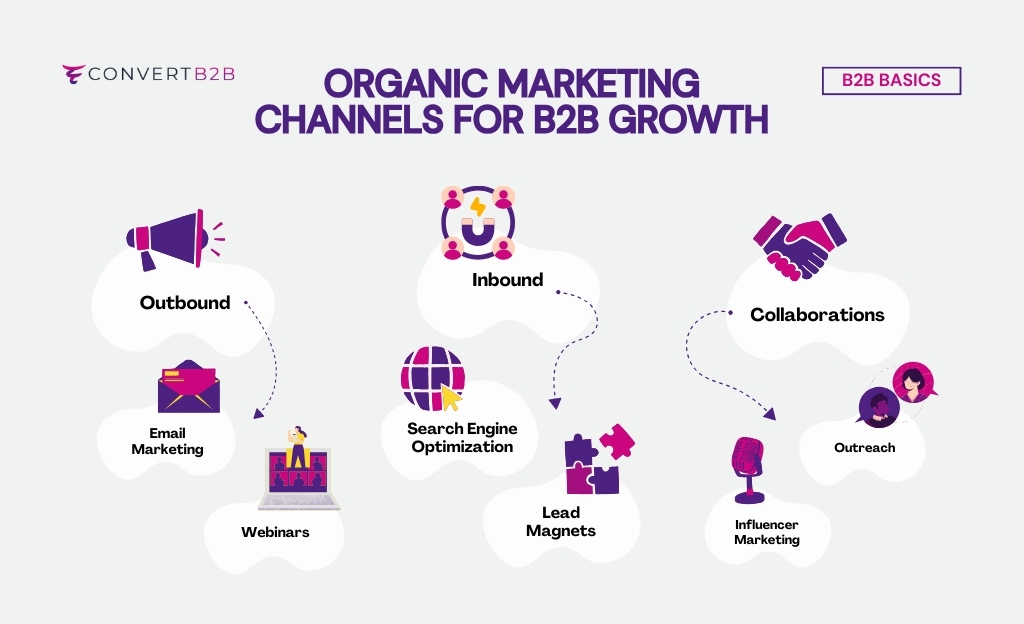Blog
Cultivating B2B Success: Top Channels for Organic Marketing Growth

Imagine: your B2B business thrives, not fueled by relentless ad spending, but by organic growth – a steady stream of qualified leads attracted by your expertise and value. That may seem too good to be true, but people have achieved wonders just with the power of organic marketing.
By harnessing the power of effective marketing channels, you can cultivate genuine connections with your target audience, build trust, and ultimately, drive sustainable growth. As such, organic marketing, with its diverse channels and long-term benefits, holds the key to unlocking dependable revenue.
As a B2B startup, it gets tricky on deciding which medium for marketing would deliver the best results. For starters, it’s important to explore what both organic and paid marketing offer.
Organic vs. Paid Marketing: Knowing the Difference
Working in the B2B space requires strategic marketing choices. Two key approaches dominate the landscape: paid marketing and organic marketing. While both have their merits, understanding their unique characteristics will help you chart the most effective course for your specific growth goals.
Paid Marketing: A Quick Burst of Power
Think of paid marketing as a powerful rocket engine. Platforms like Google Ads, LinkedIn Ads, Facebook Ads allow you to target specific audiences with laser precision, driving immediate traffic and conversions (sign-ups, demos) towards your startup. The benefits are undeniable. However, paid marketing isn’t without its drawbacks.
The fuel for this engine is money. As competition rises, ad costs (CPC) tend to increase, demanding consistent investment to maintain momentum. Once you stop paying, the traffic tap shuts off, potentially halting your growth. Your success becomes intricately linked to your ad budget.
Organic Marketing: Building a Sustainable Future
Imagine organic marketing as a sturdy, self-sustaining engine. By fostering genuine connections, you attract a loyal audience that grows organically over time.
This approach boasts distinct advantages, such as:
- Cost-Effectiveness: Unlike paid marketing, organic channels require significant effort but minimal financial investment, making them ideal for budget-conscious professionals looking to dominate the B2B space.
- Long-Term Growth: The audience you build is yours to nurture, creating a sustainable foundation for future growth beyond ad spend limitations.
- Brand Loyalty: Organic efforts foster trust and credibility, leading to higher conversion rates and loyal brand advocates.
However, remember that organic growth takes time and dedication. Creating high quality organic marketing efforts consistently demands resources and expertise, necessitating a long-term content and channel strategy.
The optimal approach often involves a strategic blend of both paid and organic marketing, but for the purpose of this article, we’ll keep focused on organic marketing channels and how B2B startups can make the most of them.
Which Marketing Channels Are Most Effective for Organic B2B Growth?

Planting the Seeds with Inbound Marketing
Think of inbound marketing as the fertile soil where trust and loyalty bloom. By creating valuable content and resources, you attract your ideal customers, establish your brand as a trusted authority, and nurture them into loyal clients. Here are a few key seeds to sow:
Search Engine Optimization (SEO): Be Found Where Your Customers Thrive
Imagine organic traffic flowing like a steady stream to your website. SEO optimizes your website and content for search engines, making it easier for potential customers to find you when they search for relevant keywords. Think of it as building a clear path leading straight to your door.
Key Benefits:
- Higher search engine rankings
- Targeted website traffic
- Improved brand credibility
- Long-term sustainable growth
Actionable Tips:
- Conduct thorough keyword research to understand your target audience’s search intent.
- Optimize your website content and structure with relevant keywords naturally integrated.
- Build backlinks from high-quality websites to boost your search authority.
- Regularly update your content with fresh, valuable information.
Content Marketing: Educate, Inspire, and Convert
Become the B2B thought leader by sharing valuable knowledge, industry insights, and practical tips through blog posts, articles, infographics, and even videos. By consistently providing content that resonates with your audience’s needs and challenges, you establish trust and convert them into loyal customers.
Key Benefits:
- Increased brand awareness
- Thought leadership positioning
- Lead generation and nurturing
- Improved website traffic and engagement
Actionable Tips:
- Create high-quality content that addresses your target audience’s pain points and interests.
- Utilize diverse content formats (e.g., blog posts, videos, infographics) to cater to different learning styles.
- Promote your content on social media, email marketing, and other relevant channels.
- Track your content marketing metrics to measure performance and optimize your strategy.
Social Media Marketing: Connect, Engage, and Build Your Community
Don’t underestimate the power of social media. Platforms like LinkedIn and Twitter allow you to connect with industry professionals, share thought leadership content, and participate in relevant conversations. Think of it as cultivating a vibrant online garden where you connect and engage with potential customers in their natural habitat.
Key Benefits:
- Increased brand visibility
- Community building
- Real-time engagement
- Lead generation and nurturing opportunities
Actionable Tips:
- Identify the social media platforms where your target audience is most active.
- Create engaging content tailored to each platform’s format and audience preferences.
- Join relevant industry groups and participate in discussions to establish your expertise.
- Utilize social media advertising to reach a wider audience with targeted campaigns.
Cultivating Connections with Outbound Marketing
While inbound marketing attracts customers, outbound marketing takes a proactive approach. Here are two effective outbound channels B2B startups should definitely consider:
Email Marketing: Build Relationships, Drive Conversions

Craft personalized email messages that nurture leads, build relationships, and ultimately drive conversions. Email allows you to segment your audience and deliver targeted messages based on their interests and buying stage. Think of it as sending personalized invitations to exclusive events, fostering closer connections. Make sure you’re keeping up with any new policies and updates on sending emails.
Key Benefits:
- Highly targeted outreach
- Personalized communication
- Cost-effective marketing channel
- Measurable results and campaign optimization
Actionable Tips:
- Segment your email list based on demographics, interests, and buying stage.
- Craft compelling subject lines and email content that resonates with your audience.
- Utilize automation tools to send personalized email sequences based on user behavior.
- A/B test different elements to optimize email performance and click-through rates.
Webinars and Online Events: Engage, Educate, and Convert
Showcase your expertise and engage your target audience in real-time through webinars and online events. Offer valuable presentations, case studies, or Q&A sessions to educate and nurture leads. Think of it as hosting intimate workshops where you share your knowledge and expertise directly with potential customers.
Key Benefits:
- High engagement levels
- Cost-effective alternative to in-person events
- Global reach
- Lead generation and qualification opportunities
Actionable Tips:
- Choose webinar topics relevant to your target audience’s pain points and interests.
- Promote your webinars effectively through social media, email marketing, and your website.
- Offer valuable content like presentations, case studies, or Q&A sessions.
- Make recordings available on-demand to reach those who couldn’t attend live.
LinkedIn Sales Navigator: Unlocking Real B2B Connections
While email outreach and webinars reign supreme in outbound marketing, LinkedIn Sales Navigator deserves a special mention for B2B startups. Think of it as your secret weapon, offering laser-focused targeting and powerful insights to connect with the right decision-makers, build genuine relationships, and ultimately, drive high-impact sales conversations.
Why Sales Navigator for Outbound Success?
Precision Targeting
With the LinkedIn Sales Navigator, for a low monthly cost, you can go beyond basic search and identify ideal prospects based on industry, title, company size, and even engagement with specific content. Imagine reaching qualified leads who are actively interested in your solutions, not just another generic email in their inbox.
Actionable Insights
The tool also helps you gain valuable intel on your prospects’ activities, recent news, and shared connections. Leverage this information to personalize your outreach, demonstrate understanding of their needs, and spark meaningful conversations.
Relationship Building
You can engage with prospects organically by joining relevant groups, commenting on their posts, and participating in industry discussions. This positions you as a thought leader and builds trust before you even initiate a sales pitch.
Advanced Lead Management
Organize, track, and prioritize your outreach efforts thanks to advanced lead management through the Sales Navigator. This ensures that you stay on top of interactions, measure campaign performance, and optimize your approach for maximum impact.
Tips to Conquer Outbound with Sales Navigator
- Refine Your Targeting: Be laser-focused. Use advanced filters to identify ideal prospects who fit your buyer persona perfectly.
- Personalize Your Outreach: Avoid generic messages. Leverage insights from Sales Navigator to craft personalized introductions that resonate with each prospect’s needs and interests.
- Start Conversations, Not Pitches: Focus on building relationships. Engage in genuine conversations, share valuable content, and offer insights before diving into sales talk.
- Leverage Advanced Features: Utilize Sales Navigator’s full potential. Explore saved searches, lead recommendations, and advanced analytics to optimize your outreach strategy.
Branching Out: Collaboration is Key
Building strong alliances within the B2B ecosystem leads to exponential growth. We suggest using collaborations as a third marketing stream independent of inbound and outbound efforts. Here are a few channels based on this stream to strengthen your network.
Public Relations and Media Outreach: Get Noticed by the Right People
Secure valuable media coverage to boost your brand awareness, credibility, and reach a wider audience. Think of it as earning endorsements from respected voices in your industry.
Key Benefits:
- Increased brand awareness
- Improved brand image
- Thought leadership positioning
- Access to a wider audience
Actionable Tips:
- Identify relevant journalists and publications in your industry.
- Develop compelling press releases and pitch stories that are newsworthy and relevant.
- Build relationships with journalists and leverage their expertise.
- Monitor media coverage and track its impact on website traffic and brand awareness.
Influencer Marketing: Partner with Industry Champions
Collaborate with industry influencers who resonate with your target audience. They can promote your brand and products to their established audience, leveraging their credibility and reach to drive brand awareness, trust, and ultimately, conversions. Think of it as partnering with respected leaders in your ecosystem to spread your message to a wider audience.
Key Benefits:
- Increased brand awareness and reach
- Enhanced brand credibility and trust
- Targeted audience engagement
- Access to niche communities
Actionable Tips:
- Identify relevant influencers who align with your brand values and target audience.
- Consider factors like follower demographics, engagement levels, and industry expertise.
- Develop mutually beneficial collaboration opportunities, such as product reviews, co-hosted webinars, or content creation partnerships.
- Ensure transparency and disclosure of sponsored content according to FTC guidelines.
- Track the results of your influencer marketing campaigns and measure their impact on engagement, leads, and conversions.
Organic Marketing: The Definitive Choice for a Thriving B2B Ecosystem
Organic marketing isn’t a quick fix, but a journey towards sustainable growth. While you can utilize paid channels for targeted campaigns and initial bursts, build the foundation for long-term success through organic channels like SEO, content marketing, community building, and strategic partnerships. By understanding the strengths and weaknesses of each channel, you can cultivate a thriving B2B ecosystem that attracts, engages, and converts ideal customers, propelling your business towards sustainable success.
Remember, an optimal marketing strategy is flexible and adapts to your evolving needs and resources. Continuously evaluate your channels, measure performance, and experiment to find the perfect blend that fuels your journey towards B2B dominance.

